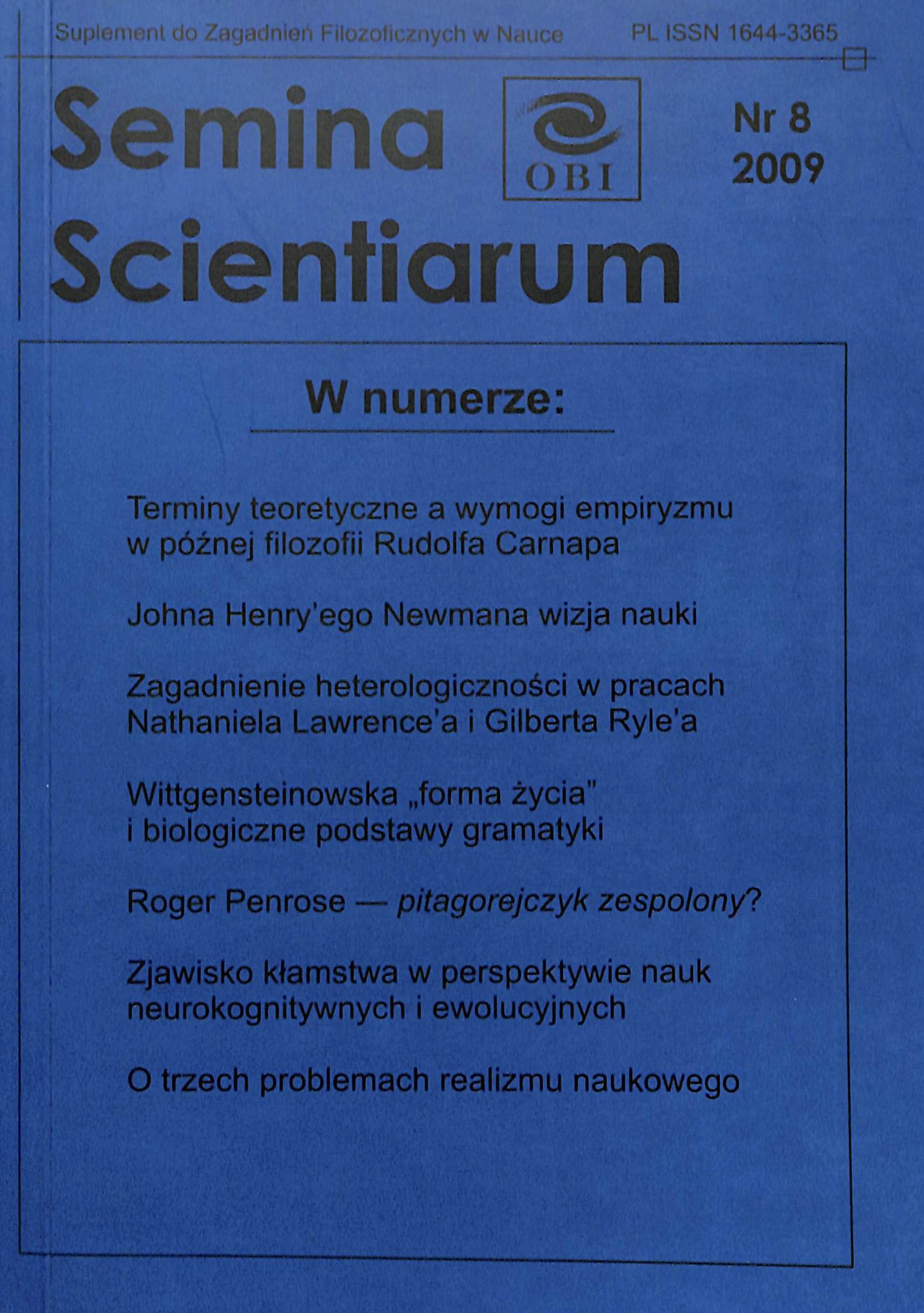Wittgensteinowska "forma życia" i biologiczne podstawy gramatyki
DOI:
https://doi.org/10.15633/ss805Abstrakt
The aim of our paper is twofold: firstly, we attempt to present Wittgenstein’s later philosophy as coherent with neuroscientific investigations of human linguistic abilities; secondly we sketch a picture of the current neuroscience in order to find the coherent solution to the problem of “hard” basis of the grammar. The central role in our presentation of Wittgenstein’s philosophy of language is played by the concept of the “form of life”. We describe two most common interpretations of this concept. At the first glance it seems to refer to the common but culture-related and conventional set of practices which serve as a ground for linguistic behaviour inside a community. However, the totally contingent base of the language cannot explain many obvious human abilities with the capability to learn the mother tongue in the first place. Neither this is Wittgenstein’s point, for certain occurances of the concept of “form of life” refer to something much more stable and cross-cultural than just a convention regarding practices. We bound this meaning of the concept to another key notion of a “primitive reaction”. The question concerning biological basis of human cognitive abilities in language formation and understanding is then addressed in order to explain some of the characteristics of the remarks presented by Wittgenstein. We address the problem of the nativity of general and particular language rules, trying to find common and indisputable ground for further discussion regarding syntactic and semantic features of language communication. The inconclusive results of modern research lead us to the cautious notion of compatibility of Wittgenstein’s philosophy of language and the cognitive theories of cross-culturally interchangeable grammar basis. In the summary we present the view of language as imperfect tool of communication hoping to develop more precise and adequate model of cognitive grammar consistent with the philosophy of the second Wittgenstein.
Pobrania
Opublikowane
Numer
Dział
Licencja
Prawa autorskie (c) 2009 Jakub Gomułka, Marcin Szafrański

Praca jest udostępniana na licencji Creative Commons Attribution-NonCommercial-NoDerivatives 3.0 Unported License.
Twórca oświadcza, że przysługują mu prawa autorskie do utworu i że nie są ograniczone w zakresie objętym niniejszym oświadczeniem oraz że utwór jest dziełem oryginalnym i nie narusza praw autorskich innych osób.
Twórca zezwala Uniwersytetowi Papieskiemu Jana Pawła II w Krakowie na nieodpłatne, niewyłączne i nieograniczone w czasie korzystanie z utworu, to jest:
- utrwalanie i zwielokrotnianie: wytwarzanie egzemplarzy utworu techniką drukarską, reprograficzną, zapisu magnetycznego oraz techniką cyfrową;
- obrotu oryginałem albo egzemplarzami, na których utwór utrwalono (wprowadzanie do obrotu, użyczenie lub najem oryginału albo egzemplarzy, publiczne wystawienie, wyświetlenie, a także publiczne udostępnianie utworu w taki sposób, aby każdy mógł mieć do niego dostęp w miejscu i w czasie przez siebie wybranym);
- włączenie utworu w skład utworu zbiorowego;
- udzielanie przez Uniwersytet Papieski Jana Pawła II w Krakowie sublicencji Creative Commons Uznanie autorstwa-Użycie niekomercyjne-Bez utworów zależnych 3.0 Polska
Uniwersytet Papieski Jana Pawła II w Krakowie udostępnia utwór na Platformie Czasopism należącej do uczelni, na licencji Creative Commons Uznanie autorstwa-Użycie niekomercyjne-Bez utworów zależnych 3.0 Polska. Tym samym uprawnia wszystkich zainteresowanych do korzystania z utworu pod następującymi warunkami:
- zostanie podany autor i tytuł utworu,
- zostanie podane miejsce publikacji (tytuł czasopisma i adres internetowy do oryginalnie opublikowanego utworu),
- utwór będzie dystrybuowany w sposób niekomercyjny,
- nie będą tworzone utwory zależne.

